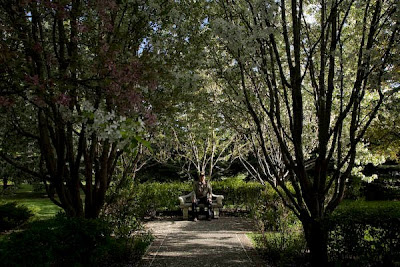Here is a little video from a fishing trip this summer with my good buddy, Jon Kontz. I am in Jerusalem now and that trout stream has never looked so nice!
Nerzhin vs. Sologdin
In “The First Circle”, Solzhenitsyn contrasts the world view of an agnostic and a Christian through the lives of two men, Nerzhin and Sologdin. Both are prisoners in the Gulag trying to make sense of their lives.
Disenchanted with Communism, Nerzhin has retreated into skepticism. Although he is a scientist working on a top secret project for Stalin, he wants to quit his mind-wearying work and return to hard labour so that he can focus his mental energy on finishing a book that he had started writing in secret.
Sologdin, on the other hand, is a Christian. Solzhenitsyn describes him in the following way:
“He was a non entity, a slave without rights. He had been inside for twelve years, but because he had been sentenced to a second term, there was no knowing when, if ever, his imprisonment would end. His wife had wasted her youth waiting in vain for him. To avoid dismissal from her present job, as from so many others, she had pretended that she had no husband and had stopped writing to him. Sologdin had never seen his only son – his wife had been pregnant when he was arrested. Sologdin had gone through the forests of Cherdynsk, the mines of Vorkuta, two periods under investigation, one of six months, one of a year, tormented by lack of sleep, drained of his strength, wasting away. His name and his future had long ago been trampled into the mud. All he possessed was a pair of well-worn padded trousers and a tarpaulin work jacket, kept at present in the storeroom in expectation of worse times to come. He was paid thirty rubles a month-enough for three kilos of sugar-but not in cash. He could breathe fresh air only at stated times authorized by the prison authorities. And in his soul there was a peace that nothing could destroy. His eyes sparkled like those of a young man. His chest, bared to the frost, heaved as though he were experiencing life to the full.”
The two men volunteered to cut wood for the camp because they believed that it was good for the soul. In between their sessions pulling on the handles of a whipsaw, they spoke about God and the meaning of life.
Nerzhin sighed.
“You know, I don’t even mind acknowledging a Creator, some sort of higher Reason in the universe. I’ll even say that I feel it to be so, if you want me to. But supposing I found out that there is no God, would I be any less moral?”
“Undoubtedly!”
“I don’t think so. And why do you have to insist, why do all of you always insist, that we must recognize not just God in some general sense but a concrete Christian God, plus the Trinity, plus the Immaculate Conception? Would my philosophical deism be the least bit shaken if I learn that not one of the Gospel miracles ever happened? Of course it wouldn’t !”
Sologdin sternly raised a hand with an admonitory finger.
There’s no other way! If you begin to doubt a single dogma of the faith, a single word of the Scriptures, all is lost! You are one of the godless!”
His hand slashed the air as though it held a saber.
“That’s what repels people! All or nothing! No compromises, no allowances made. But suppose I can’t accept it in toto? What can I be sure of? What can I rely on? I keep telling-the one thing I know is that I know nothing.”
Socrate’s apprentice took hold of the saw and offered the other handle to Sologdin.
“Another time then,” Sologdin agreed. “Lets cut wood.”
A. Solzhenitsyn – The First Circle
——-
Solzhenitsyn was exactly right that the dogmatism of Christians is what repels many. Christianity is an “all in” proposition. Faith does not deal in probabilities. From this perspective, faith might be viewed as restrictive but what is the alternative? Apart from Scriptures, what do we know? Do we know that God is One? Do we know that God is Love? Do we know that sin is a corruption of what is good? Do we know that we are created in the image of God? Do we know that life is sacred? Do we know that there will be a resurrection and a final judgment? What do we know of the Atoning Sacrifice? Do we even have a word for holiness? Do we know of the sanctity of marriage? Do we know about Christ and the future Restoration of all things? Do we have hope? Does anything remain of what we love and cherish? No. All we are left with is the gods of the Greeks and Hindus.
Christians are not far removed from skepticism. We never bought into the promise of scientific positivism embraced by Enlightenment thinkers before the time of Europe’s Troubles. We can pretty much agree with Nerzhin when he said, “The one thing I know is that I know nothing.” We know nothing… apart from faith. It is faith that makes the difference.
Joe
Joe.
He was a former roommate… about 26 yrs old.
On the day he moved in, he was beaming from ear to ear. He told me later that he had been on the streets but was trying to make a change in life. He was done with drugs, he said. Joe was scrupulously clean and I could tell that he was thrilled to be living in a decent place. I am not sure who it was that helped him move in. He sometimes spoke of his mother but according to Joe, she was living with a man that didn’t like him very much. Joe didn’t have a job although he pretended that he worked for a broker selling insurance. That was all a lie. As he later admitted, he was living off of gov’n checques. He spent most of his days laying World War Craft.
On the night I moved out he told me he was in trouble. “My mind is like a Picasso, you know those paintings where nothing makes sense.” Joe had a problem with paranoia. He once told me he thought someone was poisoning the water because it had a funny taste. I told Joe that these thing were not real and that he shouldn’t mention this to anyone. But he didn’t listen. I heard later that he had been kicked out of his place because he accused his roommate of breaking into his room and had screwed a padlock to his door.
He is living in dark, rank basement now and paying about the same rate as he did for the last place. He told me that people somehow know things about him and that there is a conspiracy to keep him from getting a place to live. He doesn’t understand that people judge by outward appearances; by the way a person carries themselves and how they speak. Joe never learned those social graces. The hallway down to Joe’s basement suite.
The hallway down to Joe’s basement suite. The Kitchen / Laundry room
The Kitchen / Laundry room
Joe’s Bedroom

Joe said he was something of an artist which, I admit, I doubted. But he gave me this picture the next week – all done with a ball point pen.
I wonder sometimes if there is hope for Joe? Was there hope for the people of Naphtali and Zebulun?
A land wrapped in darkness like a cold wet blanket. A place of gloom where every song is screamo, every procession a funeral and every glance an accusation.
Those walking in darkness have seen a great light. Isaiah 9:1,2
Elbow River
Took a few pics this evening down along the Elbow… It is real nice this time of the year. The river run through the middle of the city but I have seen beaver, muskrat, a coyote with her pups and, last night, an osprey. What I haven’t seen is any fish rise to the surface… still tempted to try my luck…





 Our house for the last 6 months. It has been a great place to stay… i just noticed from this pic that our Christmas lights are still on… I’d better go shut those off.
Our house for the last 6 months. It has been a great place to stay… i just noticed from this pic that our Christmas lights are still on… I’d better go shut those off.
Virtual Reality
Thought this was interesting:
So to put it in round numbers, over the next two decades, there is likely to be about a one-hundred fold increase in the amount of available computation capacity. Therefore, anything that can be done with computation will get significantly better, cheaper, and lighter. Robots and machines will become faster and more skillful. Mobile phones/computers will be lighter and have better screens. Cameras will be smaller and much more pervasive and the software for processing their images will be much more powerful. Games and movies will have much better and more realistic animation. Video-conferencing will be much higher quality.
In short, as the physical environment continues to slowly degrade, the virtual environment is likely to get much better. I imagine that will lead people to spend more and more time in the virtual environment. – Source
Technology saves time and has raised the standard of living. We can be thankful for this but that last paragraph scares me a little. I don’t know about you but I don’t want to become a part of that trend. Although more subtle and less destructive than drugs, it is also more pervasive and difficult to resist.
Miracles and Evidence
Paraphrased from Sir Robert Anderson “The Silence of God”:
Like Nicodemus, we cannot reason our way into the Kingdom of God. We must be born again.
Peter, an apostle of Christ, and acquainted with the miraculous, wrote “we are born again, not of perishable seed, but of imperishable, through the living and enduring word of God.” It is through the divine Word that we come to know God.
Revelation validates miracles and not vice versa. The apostle Paul wrote, even if an angel from heaven should speak a different Gospel, let him be cursed!
The evidence of miracles is subordinate to the testimony of Scripture.
The evidential value of revelation; an analogy:
An undercover agent is sent on a mission into a foreign country on a mission. His instructions are that he is to enter the country and await an envoy who will provide him with the details of his mission. How is he to know whether the envoy is credentialed? The agent is given a piece of paper that has been torn in half. The envoy will carry the other half.
Jesus is the anti-type to every type in the OT.
“The question, then, is not whether a revelation can be accredited by external evidence, but whether such evidence can avail to accredit a person whose coming has been foretold. And this no accurate thinker would for a moment dispute” A.T.R.
The World is Thus
You had no alternative your Eminence
We must work in the world… the world is thus
No senior Hanto… thus we have made the world… thus have I made it.
The Mission
I love the whole world
Fun commercial.
Song needs another line though.
I love above all the One… who made it…
Its History
Just as a follow up to the last post…
What I disagree with in some of my courses is not necessarily what is taught but how. This is especially true in some of my history courses. Rather than approaching history as a discipline some professors teach history as though it were completely subjective. They tend to focus on issues rather than on facts.
I had a really good professor last semester. He had been a colonel in the Israeli Armed Forces back in the day (he was stationed in an outpost on the Bar-Lev line during the Yom Kippur War – in the only one that wasn’t overrun). I think all of us feared him a little. I remember once, after a presentation by one of the students, he thanked the presenter, leaned back in his chair and proceeded to give a painfully honest critique of the presentation. It was uncomfortable but at the same time it showed that he took the subject matter seriously and he challenged the rest of us to do the same. Ha, as I think about it, I usually walked out of the class feeling a little dumber than when I had entered.
What I liked most about his class though was that he treated history as a discipline. He believed that objectivity was a worthy goal to strive towards and that there was a methodology that could be learned; there were questions that could be asked:
What are they trying to say? (summarize it in a sentence)
Who are they speaking to?
Where are they speaking from?
Who are they disagreeing with? (the antithesis is usually buried somewhere)
What kinds of sources are they using?
Anyway, there is nothing profound here… but it was refreshing to a have prof that believed that there was a right and wrong answer to historical questions and taught history that way. (In the first lecture he told us, “You will not find these kinds of theorist [Sartre and the like] among serious historians. You will find them among literary critics or philosophers but not historians.”) It made for some interesting discussions and good arguments… and was a contrast to some other history classes here at the university. I noticed too, that those of us who were in the class were much more motivated to learn.
I wonder if a part of the problem with the modern education system – as Obama promises to throw more money at it in the States – comes from a lack of desire by students to learn? After all, in a world of relativism, why bother?
Imperialism
Just listened to a hour long diatribe against nationalism, imperialism and the love of God. Prof blamed all the worlds problems on religion.
But, I shouldn’t be too critical… it is not our aim to understand the lives of people who lived in the past or the events they took part in. Why confine ourselves to the narrow discipline of historical studies when we have a more enlightened way of studying the past? We call it ‘social studies’. True, by replacing history with social studies, we have lost the art of story telling but we all know that those stories were nothing more than propaganda anyway. What ‘social studies’ allows that the discipline of history does not, is the opportunity for professor’s at universities to shove their pseudo-piety down the throats of their students.